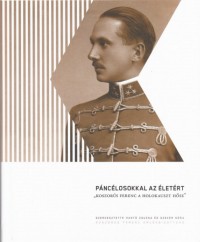 3/15/2015 - Book Signing in Budapest Honoring Holocaust Hero Col. Koszorus. On March 10, 2015, a book signing and reception introducing an excellent volume, "Armored Soldiers for Life: Ferenc Koszorus a Hero of the Holocaust" ("Páncélosokkal az életért: Koszorús Ferenc a Holokauszt hőse"), took place in Budapest. AHF was also a co-sponsor of the book. 3/15/2015 - Book Signing in Budapest Honoring Holocaust Hero Col. Koszorus. On March 10, 2015, a book signing and reception introducing an excellent volume, "Armored Soldiers for Life: Ferenc Koszorus a Hero of the Holocaust" ("Páncélosokkal az életért: Koszorús Ferenc a Holokauszt hőse"), took place in Budapest. AHF was also a co-sponsor of the book.
The book relates to Col. Ferenc Koszorus who in 1944 volunteered to militarily intervene with his First Armored Division to force the gendarmerie to leave Budapest, thereby preventing the deportation of approximately 250,000 Jews from the capitol to Nazi German death camps.
 The Hungarian Ministry of Defense and the Ferenc Koszorus Memorial Committee sponsored the event held in the Museum of Military History in the Castle Hill district of Budapest. Dr. Zsuzsa Hanto and Nora Szeker edited the book, which Prof. Zoltan Kramar in his pre-publication contribution notes “is an outstanding, easy to read collection of essays that contribute to a deeper and morecomplete understanding of events that occurred during the Nazi regime and the ensuing Soviet occupation in Hungary, but which for seventy years have been largely ignored.” In addition to the essays, the book includes documents, photographs and a CD as well as pre-publication contributions by Charles Fenyvesi, Geza Jeszenszky, John Lukacs and Helen M. Szablya. The Hungarian Ministry of Defense and the Ferenc Koszorus Memorial Committee sponsored the event held in the Museum of Military History in the Castle Hill district of Budapest. Dr. Zsuzsa Hanto and Nora Szeker edited the book, which Prof. Zoltan Kramar in his pre-publication contribution notes “is an outstanding, easy to read collection of essays that contribute to a deeper and morecomplete understanding of events that occurred during the Nazi regime and the ensuing Soviet occupation in Hungary, but which for seventy years have been largely ignored.” In addition to the essays, the book includes documents, photographs and a CD as well as pre-publication contributions by Charles Fenyvesi, Geza Jeszenszky, John Lukacs and Helen M. Szablya.
 United States Ambassador Attends Event United States Ambassador Attends Event
Along with Other Dignitaries
United States ambassador to Budapest, Colleen Bell, was present at the dignified and well-attended event along with several other dignitaries, including Geza Jeszenszky, former Minister of Foreign Affairs and ambassador to the United States; Gyorgy Szapary, former ambassador to the United States; and author, publisher and long-time sustaining AHF Kovats Circle Member Dr. Katalin Kadar-Lynn.
 Speakers Stress Need to End Division of Historical Remembrance and Historical Amnesia Speakers Stress Need to End Division of Historical Remembrance and Historical Amnesia
Minister of Defense Csaba Hende emphasized that despite the actions taken in the name of Hungary by Godless and inhuman murderers allied with the enemies of their country, Ferenc Koszorus demonstrated that there is a Hungary where oaths and human life are sacred. In her remarks, Dr. Hanto stressed that Hungarian historical remembrance unfortunately is divided and that the book’s purpose is to help end this division.
![[Download] AHF President Frank Koszorus' remarks](images/koszorusbook/KoszorusRemarks.jpg) |
| [Download] AHF President Frank Koszorus' remarks |
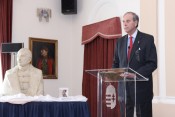 Frank Koszorus, Jr., president of the American Hungarian Federation and member of the Col. Ferenc Koszorus Memorial Committee, recalled that in 1944 Col. Koszorus wrote Hungary into the history books by being the only axis power that used military force to prevent the deportation of Jews when it blocked the expulsion of more than 250,000 Jews living in Budapest. He stressed that the victims of the Holocaust must never be forgotten, while the heroes must be remembered for the sake of historical accuracy and to serve as examples. Frank Koszorus, Jr., president of the American Hungarian Federation and member of the Col. Ferenc Koszorus Memorial Committee, recalled that in 1944 Col. Koszorus wrote Hungary into the history books by being the only axis power that used military force to prevent the deportation of Jews when it blocked the expulsion of more than 250,000 Jews living in Budapest. He stressed that the victims of the Holocaust must never be forgotten, while the heroes must be remembered for the sake of historical accuracy and to serve as examples.
 Congressman/Holocaust Survivor Reminds that Those Like Col. Koszorus Who Struggled Against Nazis Must be Recognized. As the late Tom Lantos, Member of Congress and holocaust survivor keenly observed: "Too often the efforts of those who struggle against Nazi oppresion go unrecognized. This year [1994], the 50th anniversary of Hungarian holocaust, the world reflects on the lessons learned. I am proud to honor Colonel Koszorus, a patriot, a humanitarian and a hero." Congressman/Holocaust Survivor Reminds that Those Like Col. Koszorus Who Struggled Against Nazis Must be Recognized. As the late Tom Lantos, Member of Congress and holocaust survivor keenly observed: "Too often the efforts of those who struggle against Nazi oppresion go unrecognized. This year [1994], the 50th anniversary of Hungarian holocaust, the world reflects on the lessons learned. I am proud to honor Colonel Koszorus, a patriot, a humanitarian and a hero."
Armored Soldiers for Life goes a long way to recognize, in the words of Prof. Kramar, this "soldier who [was] both a humanitarian and loyal to his oath and others who courageously resisted both German and Hungarian Nazis at a most treacherous time at great personal risk."
Federation One of Book Sponsors
The Federation is proud to have been one of the supporters of this important, highly informative and timely book.
  
- Photos courtesy Szikits Péter (HM HIM)
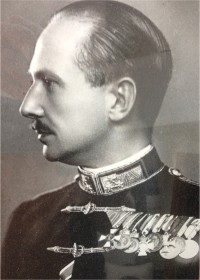 More about Col. Koszorus More about Col. Koszorus
Col. Ferenc Koszorús, as the commander of Hungary’s first armoured division, thwarted a planned government coup dubbed the gendarmerie coup, which aimed to carry out the deportation of the Jews of Budapest on July 5 and 6 of 1944.
Following the orders of Regent Miklós Horthy, Colonel Koszorús ordered his division into action against pro-Nazi forces on 5th of July 1944, preventing the coup and the deportation of hundreds of thousands of Jews from Budapest. The action delayed the Nazi takeover for 3,5 months, allowing tens of thousands to escape or find refuge and also permitted Raoul Wallenberg to coordinate his successful and effective rescue mission. Colonel Koszorús’s unmatched action was the only known case of military action taken by an axis power to prevent the deportation of Jews, Ferenc Koszorús Jr, president of the American Hungarian Federation (AHF) said, citing the late congressman Tom Lantos.
After blocking the coup, Ferenc Koszorús was forced to escape the Gestapo and fled to the United States where he would eventually serve his adopted homeland in the US Topographic Command. After the war President Truman asked him to organize Hungarian veterans in exile and train them for the eventual liberation of Hungary liberated and occupied at once by the Soviet Union in 1945. Despite strong election rhetoric of "roll back communism," the veterans in exile group was disbanded by the Eisenhower administration. Koszorus was posthumously elevated to the rank of general.
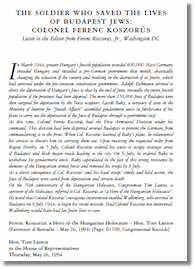 |
| [Read more] and see the Hungarian Review Article: "The Soldier Who Saved the Lives of Budapest's Jews: Col. Ferenc Koszorus." |
Hungary, heavily influenced by her fear of the barbarism of Russian Bolshevism and her desire to regain lost territories and reunite Hungarians in the Carpathian Basin, had found support in Italy and Germany and joined the Axis, a tragic mistake. As Nazi barbarism spread, thousands of Jews from surrounding states had found refuge in Hungary whose Jewish population exceeded 800,000 in March 1944. While the Jewish community in Hungary had reason
to hope that it would be spared the fate of other Jewish communities in the countries surrounding
Hungary and elsewhere, March 1944 changed everything as Nazi German troops occupied Hungary. In doing so they brought the Final Solution to the largest remaining Jewish population in Europe. Within months over 400,000 people were deported and killed by a now almost perfect mass killing machine. Hundreds of thousands Jews remained, most in the capital of Budapest. Nazi forces and their Hungarian collaborators needed to take the capital to complete their work. They were in for a surprise.
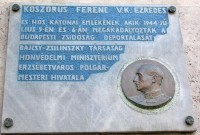 Until 1944, Hungary had enacted a series of laws that increasingly restricted the civil liberties of Jews. But with the exception of the massacres of partisans and Jews in Novi Sad in 1942 (whose perpetrators fled to avoid prosecution by Hungarian authorities only to return to Hungary with the German occupying army in 1944) and the 16,000 “alien” Jews who were expelled to German-held
Ruthenia in 1941,1 Hungary refused Nazi Germany's demands that it deport Hungarian Jews or participate in the “Final Solution.” Until 1944, Hungary had enacted a series of laws that increasingly restricted the civil liberties of Jews. But with the exception of the massacres of partisans and Jews in Novi Sad in 1942 (whose perpetrators fled to avoid prosecution by Hungarian authorities only to return to Hungary with the German occupying army in 1944) and the 16,000 “alien” Jews who were expelled to German-held
Ruthenia in 1941,1 Hungary refused Nazi Germany's demands that it deport Hungarian Jews or participate in the “Final Solution.”
When Hitler's patience ran out with the conservative leaders in Budapest and their peace-feelers
and contacts with Western allies, Nazi Germany invaded Hungary in March 1944, drastically
changing the situation of Hungary and the Jews. Hitler installed a pro-German government which
collaborated with the Nazis occupiers and helped to destroy Hungary's Jewry, which had survived
under the conservative government. Adolf Eichmann arrived to direct the deportation of
Hungary's Jews so that by the end of June, virtually the entire Jewish population of the provinces
had been deported.
Until July 1944, the more than 200,000 Jews of Budapest were protected from deportation.
Consequently, and at the instigation of the Nazi occupiers, Laszlo Baky, a secretary of state in the
Ministry of Interior for "Jewish Affairs," planned to begin and quickly complete the deportation of
Jews from the capital. Hungarians foiled that plan, however.
Following the orders of Regent Horthy, Col. Koszorus ordered his First Armored Division into action against Laszlo Baky and pro-Nazi forces in July 5, 1944, preventing the coup and the deportation of hundreds of thousands of Jews from Budapest.2 This unparalleled action was the only case known in which an Axis power used military force for the purpose of preventing deportations. The action delayed the Nazi takeover for 3.5 months, allowing tens of thousands to escape or find refuge and also permitted Raoul Wallenberg to coordinate his successful and effective rescue mission. But history was again not on Hungary’s side. A few short years later, she was under a brutal, Soviet-installed government.
After blocking the coup, he was forced to escape the Gestapo and fled to the United States where he would eventually serve his adopted homeland in the US Topographic Command. President Truman asked him to organize Hungarian veterans in exile and train them for the eventual liberation of Hungary. President Eisenhower, despite the election rhetoric of "rolling back" Commnism, disbanded the unit before the 1956 Hungarian Revolution which surprised his administration.
The late Congressman Tom Lantos (D-CA) called Col. Koszorus a "Hero of the Hungarian Holocaust" as entered in the Congressional Record on May 26, 1994. In his introduction, Mr. Lantos said, "I rise today to recognize one of the great heros of the Hungarian holocaust. Ferenc Koszorus, who at great personal sacrifice to his own life, saved thousands of Hungarian Jews from deportation to Nazi death camps." Congressman Lantos, recipient of AHF's highest award, the Col. Commandant Michael Kovats Medal of Freedom passed away in 2008. General Koszorus
Koszorus, who passed away in 1974, was posthumously promoted to the rank of General by Prime Minister Antall
after the fall of Communism. His wife, the late artist Gabriella Koszorus-Varsa researched and edited his memoirs and summarized his memoirs like this:
"The writings of Colonel Ferenc Koszorús contain wealth of fascinating and informative data relating to a critical period of Hungarian history. Based on personal experiences, his writings portray the tragic fate of Hungary during the Second World War, including the chaos caused by internal tension. These writings, moreover, not only chronicle certain key political and military events, they also offer solutions to exceedingly complex problems within the framework of high moral bearings, without which solutions prove to be ephemeral.
Col. Koszorús military competence, expertise, and outstanding character enhanced his clear-sighted judgement. The selfless dedication he exhibited also characterized his family. He is descended from Transylvanian nobility, born into a family that voluntarily relinquished its special privileges during the Hungarian Revolution of 1848 in a demonstration of solidarity with the Hungarian nation. In this spirit, Col. Koszorús acted decisively to further the interests of his beloved homeland, motivated solely by a desire to serve the common good, even at great personal risk to himself. He was not drawn to any form of political extremism at a time when many could not resist the lure of seemingly simple answers to intricate questions or career advancement.
In an extraordinary action taken in July of 1944, Col. Koszorús intervened to block an attempted coup by Laszló Baky. Koszorús's valiant effort preserved the remnants of the legitimate Hungarian political system, prevented the overthrow of the Regent, and thwarted the deportation of the more than 250,000 Jews concentrated in Budapest. Only in Hungary did a military unit employ force against an attempted coup supported by Nazi collaborators, the German occupation forces, and Adolf Eichmann.
Col. Koszorús's merit was not only that he carried out the Regent's order at a time when such orders were generally disobeyed, but that he voluntarily offered his services to block Baky's perfidious act. He specifically requested the Regents order by way of the Commanding Officer of the Royal Guard, General Károly Lázár to preserve the legality of his intervention and thereby remain faithful to his oath. It was his unshakable convictions that "without trustworthiness there is no `soldier', without strict adherence to a soldier's military oath, there is no trustworthiness."
After blocking the Nazi coup, Col. Koszorús was sought by the German Gestapo. To avoid certain arrest and execution, he first fled to western Hungary, and then after becoming ill he took a medevac train to Austria and ultimately to Bavaria. He arrived in the United States with his family in 1951, after which he continued to serve both his former homeland as well as his adopted country, working for the U.S. Topographic Command.
In October of 1951, during the Truman administration, Congress authorized funds to organize and train legions of European immigrant veterans for the eventual liberation of their homelands. Finding Col. Koszorús to be untainted by either Nazism or Communism and judging him to be a reliable military man, the U.S. entrusted him with the task of establishing the Hungarian veteran armed force.
In addition to his new career, Col. Koszorús continued to research and write on a variety of topics relating to Central and Eastern Europe. Out of modesty, he did not initially publicize his voluntary and historic intervention against the conspirators. Only after becoming aware of the misunderstanding and disinformation surrounding the Baky affair did he take the advice of friends and publish in 1961 his version of the events, so that "this episode be preserved for posterity in a factual and objective manner."
In 2009, as part of the Holocaust Memorial Month, the Embassy of Hungary sponsored the Carl Lutz and the Legendary Glass House in Budapest traveling exhibit in Washington, DC. The Carl Lutz Foundation, Hungarian American Coalition, Lantos Foundation for Human Rights and Justice, Mensch International Foundation and the Embassies of Switzerland and Israel are co-sponsors. The Federation believes it would be appropriate that the Embassy of Hungary, as a representative of all Hungarians, expand such exhibits to include Hungarian heroes of the Holocaust. [download the statement]
In the statement, AHF honored additional Hungarian heroes:
AHF REMEMBERS THE HEROES OF THE HUNGARIAN HOLOCAUST
The Federation takes this opportunity to remember Carl Lutz, Raoul Wallenberg and other foreign<
diplomats as well as the Hungarian heroes who at great personal peril saved many Jewish lives.
The Hungarians include but, of course, are not limited to the following individuals:
- Janos Esterhazy opposed the Slovak Nazi puppet regime of Jozef Tiso. At great peril to himself, he was the only member of the Slovak Parliament to vote against the law authorizing the deportation of Jews in 1942. Later, Esterhazy personally saved Jews from the Holocaust.
- General Vilmos Nagybaczoni-Nagy who upon being appointed minister of defense by the Kallay
government took measures to end the gross abuse threatening the lives of Jews and others in
the auxiliary labor force;
- Tibor Baranszky who, as secretary to Monsignor Angelo Rotta, the Vatican’s ambassador to
Budapest, saved many lives by distributing protective letters to Jews on forced marches and
elsewhere;
- Roman Catholic Priest Ferenc Kallo who gave Jews life‐saving certificates of baptism and who was killed by the Arrow Cross on October 29, 1944;
- Jozsef Antall Senior, who as a member of the ministry of internal affairs for civilian refugees
gave refuge to and thereby saved Jews and Poles and who enjoyed the support and confidence
of Minister of Interior Ferenc Keresztes‐Fischer and Prime Ministers Pal Teleki and after his death Miklos Kallay;
- Col. Ferenc Koszorus, posthumously promoted to the rank of General by Prime Minister Antall after the fall of Communism, who volunteered his services and mobilized the 1st Armored Division under his command to militarily intervene on July 5, 1944 to stop Laszlo Baky, a secretary of state in the Ministry of Interior for “Jewish Affairs," from deporting the approximately 200,000 plus Jews from Budapest.2
The Federation believes that the extraordinary courage, moral strength and fortitude of these and
other individuals who despite overwhelming odds were willing to confront evil and act on behalf
of humanity serve as examples for all of humankind; they must never be forgotten.
________________________________________
1 When Minister of Interior Ferenc Keresztes-Fischer learned the details of these actions, he ordered them to be stopped.
2 On the 50th anniversary of the Hungarian Holocaust, Congressman Tom Lantos (for whom one of the co-sponsoring
organizations is named) referred to Col. Koszorus as "A Hero of the Hungarian Holocaust" and stated that "[a]s a result of his extraordinarily brave efforts, taken at great risk in an extremely volatile situation, the eventual takeover of Budapest by the Nazis was delayed by 3 1/2 months. This hiatus allowed thousands of Jews to seek safety in Budapest, thus sparing them from certain
execution. It also permitted the famous Raoul Wallenberg, who arrived in Budapest on July 9, 1944, to coordinate his successful
and effective rescue mission." As is clear from Congressman Lantos’ remarks, had Col. Koszorus’ intervention not occurred,
Wallenberg would not have had many lives to save. Neither would have Lutz.
[<< Back to All AHF News] | 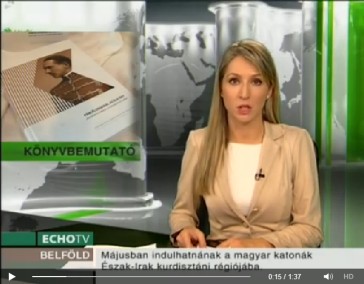
Páncélosokkal az életért címmel Koszorús Ferenc posztumusz vezérkari ezredesnek emléket állító könyv jelent meg. A méltánytalanul elfeledett tiszt a II. világháború idején Horthy Miklós parancsának engedelmeskedve katonai erővel akadályozta meg a budapesti zsidók deportálását. Ezzel zsidó családok ezreit mentette meg a biztos pusztulástól. A könyvbemutatóra Amerikában élő fia is hazalátogatott. A mű létrejöttét az Echo Televízió is támogatta.
Buy books related to the Holocaust and Col. Koszorus on AHF's Amazon Store 
 "I rise today to recognize one of the great heros of the Hungarian holocaust. Ferenc Koszorus, who at great personal sacrifice to his own life, saved thousands of Hungarian Jews from deportation to Nazi death camps... [his action] permitted the famous Raoul Wallenberg, who arrived in Budapest on July 9, 1994, to coordinate his successful and effective rescue mission" - Hon. Congressman Tom Lantos, Congressional record [Read Full Speech] "I rise today to recognize one of the great heros of the Hungarian holocaust. Ferenc Koszorus, who at great personal sacrifice to his own life, saved thousands of Hungarian Jews from deportation to Nazi death camps... [his action] permitted the famous Raoul Wallenberg, who arrived in Budapest on July 9, 1994, to coordinate his successful and effective rescue mission" - Hon. Congressman Tom Lantos, Congressional record [Read Full Speech]
“Whoever Saves a Life, it is Considered as if
He Saved an Entire World” (Jerusalem Talmud)
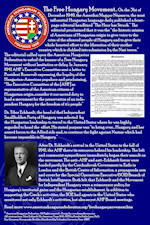 |
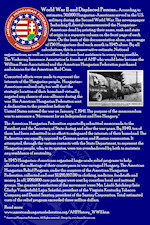 |
| AHF, Tibor Eckhardt, and
the "Free Hungary Movement"
seeking to extract Hungary
from the Axis sphere
[read more] |
AHF relief efforts during WWII [click for large image] |
Book Review
Szerkesztette: Hantó Zsuzsa és Szekér Nóra
"Páncélosokkal az életért: Koszorús Ferenc a Holokauszt hőse"
1944 nyarán lezajlott a magyar vidék zsidóságának deportálása.
A magyar csendőrség német irányítóik legnagyobb megelégedésére nem egész két hónap alatt 437.000 már kifosztott és megalázott embert –zömmel nőket, időseket és gyerekeket, hiszen a férfiak munkaszolgálaton voltak - zsúfoltak példátlan durvasággal vagonokba és indítottak német haláltáborokba. Ez a sors várt Budapest zsidóságára is. Már megjelentek a főváros utcáin a hírhedt Baky László csendőrei és a budapesti zsidóság rettegve várta sorsa beteljesülését. És ekkor bekövetkezett a csoda!
Horthy Miklós kormányzó utasítására Koszorús Ferenc vezérkari ezredes az 1. Páncélos Hadosztály harckocsi ezredével megjelent a város stratégiai pontjain és erélyesen utasította a deportálni készülő csendőrséget az elvonulásra. Ezt Baky - kénytelenségből és elkeseredve - meg is tette. Visszavonulóban, búcsúzásképen még gyorsan deportáltak a főváros környéki zsidóságot, akik közül több tízezren soha nem jöttek vissza, de a majdnem negyedmilliós budapesti zsidóság egyenlőre megmenekült.
Ennek a hőstettnek állít emléket a most megjelent Páncélosokkal az életért „Koszorús Ferenc a holokauszt hőse” című tanulmánykötet, Hantó Zsuzsa és Szekér Nóra szerkesztésében. A könyv Koszorús Ferenc fiának visszaemlékezése után tanulmányt közöl Baky László puccskísérletének megakadályozásáról, majd a különböző ellenállási formákról és lehetőségekről olvashatunk, amelyek a nyilas hatalomátvételig akadályozták a totális fasizmus működését Magyarországon. Lényegileg ezt a témát fejti ki nagy részletességgel a Magyar Függetlenségi Mozgalom tevékenységéről szóló fejezet, melyben sok névvel és adattal támasszák alá a könyv fő mondanivalóját, hogy igenis volt Magyarországon polgári és konzervatív ellenállás Hitlerrel és követőivel szemben. Sajnos következetlenség, konspirációs hibák és a diszkréció teljes hiánya eleve korlátozta lehetőségeiket. Zsidó tragédia eddig nem feltárt része a Szovjetunióba menekültek sorsa, akiket határátlépés miatt vontak felelősségre a szovjet hatóságok. Szabadabb, jobb életre vágytak és a Gulágra kerültek!
Befejezésül a történeti visszaemlékezések egyoldalúságával vitatkozik a könyv, kiterjesztve vizsgálódásainak körét. Dokumentumjellegű munka, sok olvasmányos részlettel. Sajnos számadatai pontatlanok, a megmentett budapesti zsidók számát majdnem duplázza (van ahol 300.000-t említ), Romsics Ignác hadifogoly csere létszáma sem egyezik. Függelékben az auschwitzi jegyzőkönyv és más dokumentumok, valamint színes képmelléklet növeli a könyv használhatóságát.
Sok újat tartalmazó értékes munka állít emléket e könyvben egy nagyszerű embermentőnek!
- Róbert Péter
Országos Rabbiképző – Zsidó Egyetem, or Országos Rabbiképző Intézet / Jewish Theological Seminary – University of Jewish Studies
Related Articles:
 Megemlékezést tartottak Koszorús Ferenc sírjánál: „Koszorús páratlan fellépése az egyetlen olyan ismert eset, amikor egy tengelyhatalom katonai erőt alkalmazott azért, hogy zsidók deportálását akadályozza meg” – idézte a fia az amerikai kongresszusba beválasztott egyetlen holokauszt-túlélőnek, Tom Lantosnak a képviselőházban elmondott szavait. [tovább] Megemlékezést tartottak Koszorús Ferenc sírjánál: „Koszorús páratlan fellépése az egyetlen olyan ismert eset, amikor egy tengelyhatalom katonai erőt alkalmazott azért, hogy zsidók deportálását akadályozza meg” – idézte a fia az amerikai kongresszusba beválasztott egyetlen holokauszt-túlélőnek, Tom Lantosnak a képviselőházban elmondott szavait. [tovább]
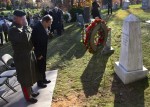 Holokauszt-emlékév - Megemlékezést tartottak Koszorús Ferenc ezredes sírjánál: A megemlékezés virágait helyezték el szombaton Koszorús Ferenc ezredes sírjánál amerikai magyar szervezetek és a washingtoni magyar nagykövetség képviselői az arlingtoni Columbia Gardens Temetőben [tovább] Holokauszt-emlékév - Megemlékezést tartottak Koszorús Ferenc ezredes sírjánál: A megemlékezés virágait helyezték el szombaton Koszorús Ferenc ezredes sírjánál amerikai magyar szervezetek és a washingtoni magyar nagykövetség képviselői az arlingtoni Columbia Gardens Temetőben [tovább]
11/15/2014 - AHF, member organizations, and representatives of the Hungarian embassy in Washington DC placed flowers at the grave of Holocaust Hero, colonel Ferenc Koszorús, in Columbia Gardens Cemetery in Arlington. Koszorús, as the commander of Hungary’s first armoured division, thwarted a planned government coup dubbed the gendarmerie coup, which aimed to carry out the deportation of the Jews of Budapest on July 5 and 6 of 1944. [read more]
 Koszorús Ferenc zsidók százezreit mentette meg: „A soá is elfoglalta méltó helyét történelmünkben legnagyobb nemzeti tragédiáink között, miénk a szégyene, a vesztesége és a gyásza is” – mondta Hende Csaba honvédelmi miniszter pénteken Koszorús Ferenc posztumusz vezérezredes emléktáblájának koszorúzási ünnepségén Budapesten, a Dohány utcában. [tovább] Koszorús Ferenc zsidók százezreit mentette meg: „A soá is elfoglalta méltó helyét történelmünkben legnagyobb nemzeti tragédiáink között, miénk a szégyene, a vesztesége és a gyásza is” – mondta Hende Csaba honvédelmi miniszter pénteken Koszorús Ferenc posztumusz vezérezredes emléktáblájának koszorúzási ünnepségén Budapesten, a Dohány utcában. [tovább]
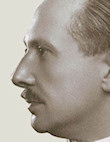 3/23/2011 - AHF honors Col. Ferenc Koszorus, Sr., and Hungarian Heroes of the Holocaust, reflects on Holocaust Memorial Month. AHF honors the millions of lives lost and the untold suffering caused by Nazism and Communism. But even during the horrors of WWII, stories of resistance to Nazi atrocities emerged. When Hitler's patience ran out with the conservative leaders in Budapest and their peace-feelers
and contacts with Western allies, Nazi Germany invaded Hungary in March 1944, drastically
changing the situation of Hungary and the Jews. [read more] 3/23/2011 - AHF honors Col. Ferenc Koszorus, Sr., and Hungarian Heroes of the Holocaust, reflects on Holocaust Memorial Month. AHF honors the millions of lives lost and the untold suffering caused by Nazism and Communism. But even during the horrors of WWII, stories of resistance to Nazi atrocities emerged. When Hitler's patience ran out with the conservative leaders in Budapest and their peace-feelers
and contacts with Western allies, Nazi Germany invaded Hungary in March 1944, drastically
changing the situation of Hungary and the Jews. [read more]
 6/8/2012 - Hungarian Review publishes article, "The Soldier Who Saved the Lives of Budapest's Jews: Col. Ferenc Koszorus." The courageous intervention of Col. Ferenc Koszorus and his loyal First Armored Division on July 6, 1944 blocked the deportation of the more than 250,000 Jews of Budapest. In paying tribute to Col. Koszorus, former Congressman Tom Lantos, a survivor of the Holocaust, noted that the Koszorus intervention "permitted... Wallenberg, who arrived in Budapest on July 9, 1944, to coordinate his successful and effective rescue mission." 6/8/2012 - Hungarian Review publishes article, "The Soldier Who Saved the Lives of Budapest's Jews: Col. Ferenc Koszorus." The courageous intervention of Col. Ferenc Koszorus and his loyal First Armored Division on July 6, 1944 blocked the deportation of the more than 250,000 Jews of Budapest. In paying tribute to Col. Koszorus, former Congressman Tom Lantos, a survivor of the Holocaust, noted that the Koszorus intervention "permitted... Wallenberg, who arrived in Budapest on July 9, 1944, to coordinate his successful and effective rescue mission."
[read more]
 6/12/2012 - In a related story, Heti Valasz publishes: "Emlékezzünk a magyar hősökre is! A Wallenberg-év lehetőségei": Mindent el kell követni, hogy Kelet-Európa valós második világháborús szerepe rögzüljön a nyugati és az amerikai köztudatban. [tovább] 6/12/2012 - In a related story, Heti Valasz publishes: "Emlékezzünk a magyar hősökre is! A Wallenberg-év lehetőségei": Mindent el kell követni, hogy Kelet-Európa valós második világháborús szerepe rögzüljön a nyugati és az amerikai köztudatban. [tovább]
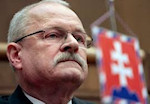 9/13/2011 - Slovak President shamefully calls Janos Esterhazy, a hero of the Holocaust, a follower of Hitler. AHF continues call for rehabilitation of Janos Esterhazy, reacts to Slovak falsification of history... Esterhazy was the only member of the Slovak Parliament in 1942 who voted against expelling the Jews, setting an example which few dared to follow in the parts of Europe controlled by Adolf Hitler's Germany. He was detained by the Nazis and died in a communist prison. He is still classified as a war criminal in Slovakia. [read more] 9/13/2011 - Slovak President shamefully calls Janos Esterhazy, a hero of the Holocaust, a follower of Hitler. AHF continues call for rehabilitation of Janos Esterhazy, reacts to Slovak falsification of history... Esterhazy was the only member of the Slovak Parliament in 1942 who voted against expelling the Jews, setting an example which few dared to follow in the parts of Europe controlled by Adolf Hitler's Germany. He was detained by the Nazis and died in a communist prison. He is still classified as a war criminal in Slovakia. [read more]
 11/8/2011 - The Anti-Defamation League presented the Jan Karski Courage to Care Award to Count Janos Esterhazy. This comes just two months after the Slovak President shamefully calls this hero of the Holocaust a follower of Hitler. 11/8/2011 - The Anti-Defamation League presented the Jan Karski Courage to Care Award to Count Janos Esterhazy. This comes just two months after the Slovak President shamefully calls this hero of the Holocaust a follower of Hitler.  AHF continues to express concern over Slovakia's anti-Hungarian measures."Those who defended and aided Jews and other victims of the Nazislaughter merit our recognition and our eternal thanks. They were individuals who followed the call to conscience, which is surely no simple matter... Count János Esterházy was such a person of conscience, one who had more than enough reason to remain silent." [read more] AHF continues to express concern over Slovakia's anti-Hungarian measures."Those who defended and aided Jews and other victims of the Nazislaughter merit our recognition and our eternal thanks. They were individuals who followed the call to conscience, which is surely no simple matter... Count János Esterházy was such a person of conscience, one who had more than enough reason to remain silent." [read more]
Congressional Record
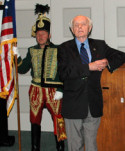 FERENC KOSZORUS: A HERO OF THE HUNGARIAN HOLOCAUST FERENC KOSZORUS: A HERO OF THE HUNGARIAN HOLOCAUST
HON. TOM LANTOS
(Extension of Remarks - May 26, 1994)
[Page: E1109]
HON. TOM LANTOS
in the House of Representatives
THURSDAY, MAY 26, 1994
(Tom Lantos, who died in February 2008 of esophageal cancer, was honored with the Presidential Medal of Freedom, the nation's highest civilian honor. He was also recipient of AHF's highest honor, the Col. Commandant Michael Kovats Medal of Freedom [read more])
- Mr. LANTOS. Mr. Speaker, this year marks the 50th anniversary of the Hungarian holocaust. I rise today to recognize one of the great heros of the Hungarian holocaust. Ferenc Koszorus, who at great personal sacrifice to his own life, saved thousands of Hungarian Jews from deportation to Nazi death camps.
- During the turbulent time in the summer of 1944, advancing Allied forces were closing in on Berlin while Hitler was racing to implement the final solution, the destruction of the Jewish race. There were many acts of heroic compassion and humanitarianism during this period. I would like to recount the story of Col. Ferenc Koszorus, one of the most remarkable examples of bravery and courage of the time.
- By June 1944, the Nazis had incarcerated and liquidated most of the Jewish population of Europe. In the capital of Hungary, Budapest, there remained approximately 250,000 Jews still alive. Budapest was still under control of the Hungarian police force. The Nazis believed that this force was not ruthless and brutal enough to deal adequately with the complete destruction of the large remaining Jewish population of Budapest.
- Ferenc Koszorus was a colonel in the Hungarian Army in charge of the First Magyar Armored Division stationed in and around Budapest. He learned that Laszlo Baky, Secretary of State and director of all security forces, with the exception of the army, had planned a coup d'etat to install a police force completely subservient to the Nazis. They would see to it that Hungary was purged of all remaining Jews.
- With the help of the Gestapo, Baky formed several battalions of `gendarmerie' forces loyal to him. Orders from the Regent to disband the gendarmerie went unheeded. Colonel Koszorus controlled the last remaining active army unit in Hungary. At a time when few others would stand up to the Nazi occupation, Colonel Koszorus took the initiative to resist.
- Realizing the severity of the situation, Colonel Koszorus consulted with the Regent and began preparations on his own to stop Baky and the gendarmerie battalions. On July 5, 1944 at 11:30 p.m., Colonel Koszorus ordered the units of the 1st Armored Division to take up positions at strategic points in Budapest, sealing off all road leading into the city. By 7:00 a.m. on July 6, 1944 all the units were in place and Colonel Koszorus informed Baky that if his gendarmerie did not leave and disband they would be destroyed. On July 7, 1944 Baky capitulated and evacuated his forces.
- Colonel Koszorus' unparalleled action was the only case known in which an Axis power used military force for the purpose of preventing the deportation of the Jews. As a result of his extraordinarily brave efforts, taken at great risk in an extremely volatile situation, the eventual takeover of Budapest by the Nazis was delayed by 3 1/2 months. This hiatus allowed thousands of Jews to seek safety in Budapest, thus sparing them from certain execution. It also permitted the famous Raoul Wallenberg, who arrived in Budapest on July 9, 1994, to coordinate his successful and effective rescue mission
- In October 1944, after the Germans had taken Budapest, Colonel Koszorus was forced into hiding to avoid certain execution by the Gestapo. While alive, Colonel Koszorus never received recognition of his actions. In 1991, Ferenc Koszorus was posthumously promoted to the rank of general by the Hungarian Government. His memory is honored with a plaque placed in the famous Dohany Street Synagogue in Budapest.
- Therefore it is with great honor and pride that I rise today in recognition valiant, patriotic efforts of Ferenc Koszorus. Many thousands of families are alive today as a result of the heroic actions of one man who stood up for his beliefs in a very uncertain and dangerous time. His loyalty to his country and love of humanity are an inspiration to all who struggle against oppression and the vile bigotry of racism.
- Too often the efforts of those who struggle against the Nazi oppression go unrecognized. This year, the 50th anniversary of Hungarian holocaust, the world reflects on the lessons learned. I am proud to honor Colonel Koszorus, a patriot, a humanitarian, and a hero.
[< back to all AHF news]
Join online!

|




 Frank Koszorus, Jr., president of the American Hungarian Federation and member of the Col. Ferenc Koszorus Memorial Committee, recalled that in 1944 Col. Koszorus wrote Hungary into the history books by being the only axis power that used military force to prevent the deportation of Jews when it blocked the expulsion of more than 250,000 Jews living in Budapest. He stressed that the victims of the Holocaust must never be forgotten, while the heroes must be remembered for the sake of historical accuracy and to serve as examples.
Frank Koszorus, Jr., president of the American Hungarian Federation and member of the Col. Ferenc Koszorus Memorial Committee, recalled that in 1944 Col. Koszorus wrote Hungary into the history books by being the only axis power that used military force to prevent the deportation of Jews when it blocked the expulsion of more than 250,000 Jews living in Budapest. He stressed that the victims of the Holocaust must never be forgotten, while the heroes must be remembered for the sake of historical accuracy and to serve as examples.